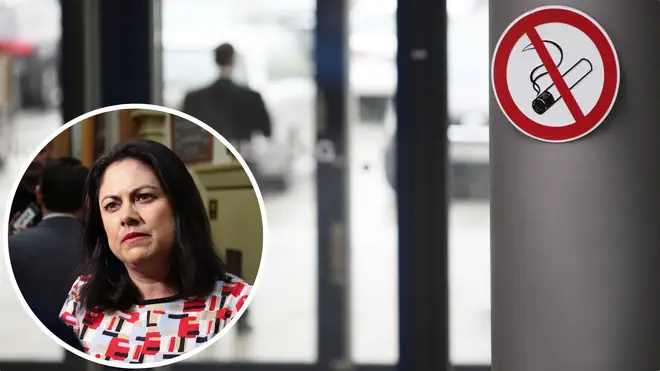
Richard Spurr 1am - 4am
9 December 2021, 23:21 | Updated: 9 December 2021, 23:24

New Zealand's government plans to bring in a new law which would effectively ban anyone under the age of 14 from ever being allowed to buy cigarettes in their lifetime.
Under legislation announced on Thursday, the minimum age to buy cigarettes would keep rising year after year.
It means that, in theory, 65 years after the law takes effect, people will only be able to buy cigarettes if they can prove they are at least 80 years old.
In an interview with the Associated Press, New Zealand's Associate Health Minister Dr Ayesha Verrall, who is spearheading the plan, said her work at a public hospital in Wellington involved telling several smokers they had developed cancer.
"You meet, every day, someone facing the misery caused by tobacco," Verrall said. "The most horrible ways people die. Being short of breath, caused by tobacco."
Despite the plan, officials hope smoking will fade away decades before that, with a goal of having fewer than 5 per cent of New Zealanders smoking by 2025.
Read more: 'Go as if there's a pandemic': Scots left confused over contradictory Xmas party advice
Read more: Rust film set not 'dangerous' or 'chaotic' despite crew member's death, says Alec Baldwin
Other parts of the plan include allowing only the sale of tobacco products with very low nicotine levels and slashing the number of stores that can sell them.
The changes would be brought in over time to help retailers adjust.
Because the current minimum age to buy cigarettes in New Zealand is 18, the lifetime smoking ban for youth would not have an impact for a few years.

Caller wants complete ban on smoking
Smoking rates have steadily fallen in New Zealand for years, with only about 11 per cent of adults now smoking and just 9 per cent smoking every day.
The daily rate among Indigenous Maori remains much higher at 22 per cent - but the government plans to tackle that with a taskforce to reduce smoking in that group.
Already the government has imposed big tax increases on cigarettes in recent years - but some question why they are not being raised further.
Read more: 'That man doesn't take responsibility': MPs on Cross Question criticise Boris Johnson
Read more: Boris backlash: Three parties probed as pressure grows on PM over Xmas scandal
Verrall said the government did not believe further tax increases would have an impact.
She added: "It's really hard to quit and we feel if we did that, we'd be punishing those people who are addicted to cigarettes even more."
She also said tax measures penalise low-income people more, who are more likely to smoke.
Verrall said tobacco smoking specifically remains a leading cause of preventable deaths in New Zealand, killing up to 5,000 people a year, and so the new laws would not affect vaping, which she described as an "appropriate quit tool".
However she added she was watching an increase in vaping amongst young people "really closely".

'What has the smoking ban got to do with the EU?'
While public health experts have generally welcomed the New Zealand plan, not everybody is happy.
Sunny Kaushal said some stores could be put out of business. Kaushal chairs the Dairy and Business Owners Group, which represents nearly 5,000 corner stores, often called dairies in New Zealand, and petrol stations.
"We all want a smoke-free New Zealand," he said.
"But this is going to hugely impact small businesses. It should not be done so it is destroying dairies, lives and families in the process. It's not the way."
Kaushal said the tax increases on tobacco had already created a black market that was being exploited by gangs, and the problem would only get worse. He said smoking was already in its twilight in New Zealand and would die away of its own accord.
"This is being driven by academics," he said, adding that stakeholders had not been consulted.
Read more: Ex-Met standards boss enrages LBC listeners saying 'no public interest' in No10 Xmas party
Read more: More evidence will emerge of Downing Street Christmas party, says former top cop
But Verrall said she didn't believe the government was overreaching because statistics showed the vast majority of smokers wanted to quit anyway, and the new policies would only help them achieve their goal.
She said the pandemic had helped people gain a new appreciation for the benefits of public health measures and rallying communities, and that perhaps that energy could be harnessed not only to tackle smoking but also diseases like diabetes.
Verrall said she had never smoked herself but her late grandmother did, and it likely compromised her health.
"It's a really cruel product," Verrall said.